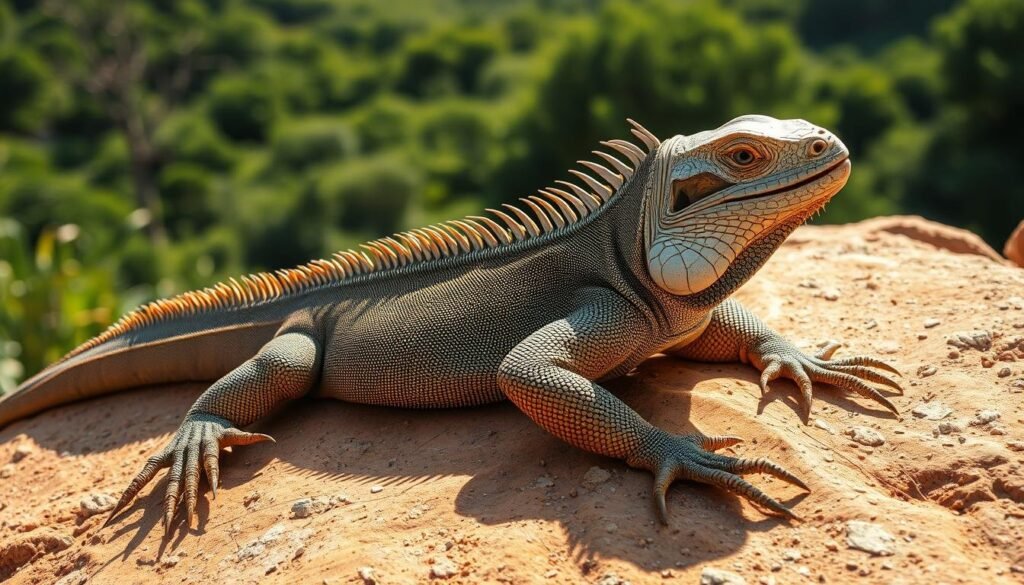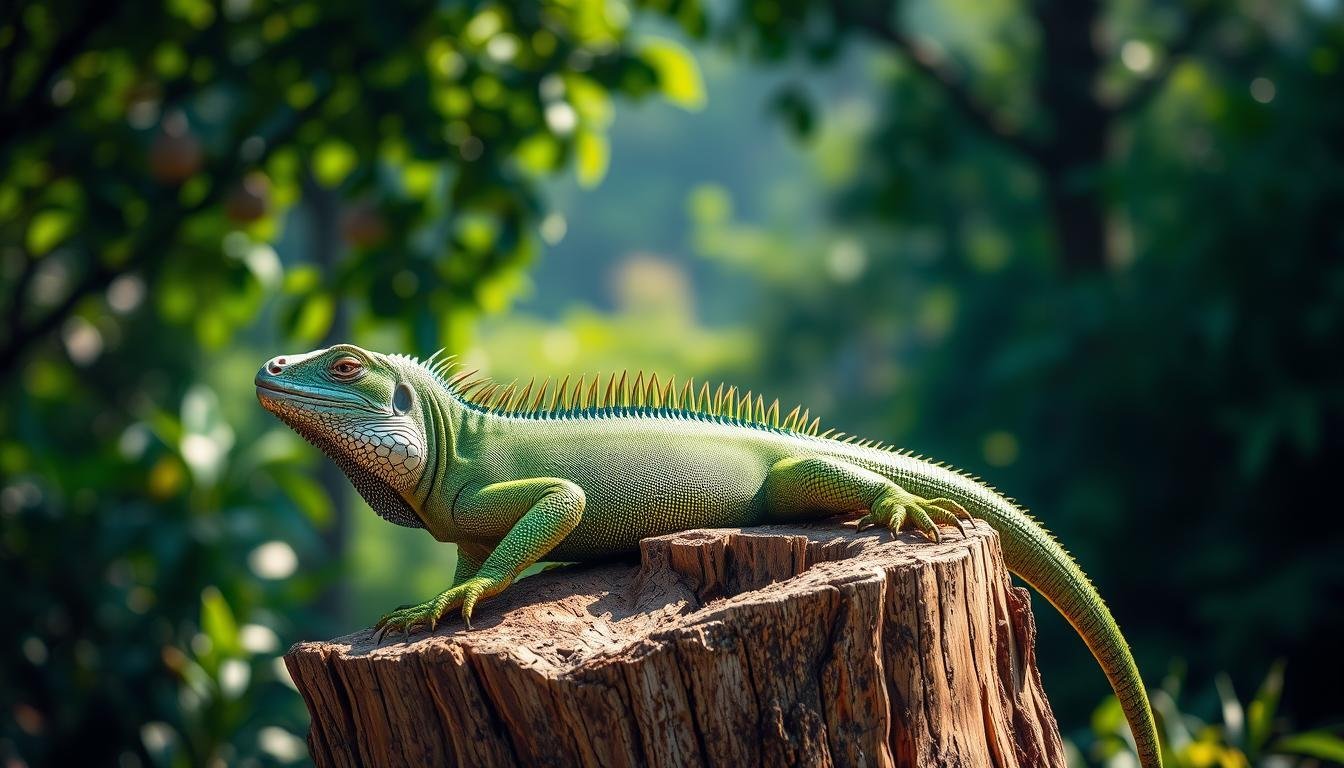Why Iguanas Bask in Morning Sunlight? Have you seen your pet iguana looking for the morning sun? It’s a natural behavior that’s both interesting and important for their health.
Exposing themselves to the sun’s warmth helps iguanas in many ways. It helps them keep their body temperature right, boosts their metabolism, and supports strong bones.
Learning why iguanas love the morning sun can help us better care for them.
Contents
- 1 The Biology Behind Iguana Thermoregulation
- 2 Why Do Iguanas Bask in Morning Sunlight?
- 3 The Physical Process of Basking
- 4 Basking Behaviors in Wild and Captive Iguanas
- 5 Understanding Iguana Basking Behavior
- 6 FAQ: Why Iguanas Bask in Morning Sunlight?
- 6.1 Why do iguanas need to bask in morning sunlight?
- 6.2 What is thermoregulation, and why is it important for iguanas?
- 6.3 How do iguanas behave when basking in the morning sunlight?
- 6.4 What are the ideal conditions for basking in captive iguanas?
- 6.5 What health issues can arise if iguanas do not receive sufficient heat?
- 6.6 How do seasonal variations affect the basking habits of iguanas?
- 6.7 Can iguanas get too much sunlight or heat?
The Biology Behind Iguana Thermoregulation
Thermoregulation is key for iguanas to survive. They need outside heat to keep their body temperature right. This is vital for their metabolism.
Iguanas need a certain temperature to digest food well. The best temperature for them is between 85°F to 90°F (29°C to 32°C). At these temps, their enzymes work best, and they absorb nutrients well.
If it gets too cold, their digestion slows down. This can cause problems like indigestion or not getting enough nutrients.
Maintaining the right temperature is vital for iguanas. It helps them digest food and absorb nutrients.
Metabolic Functions Dependent on Heat
Heat is also important for iguanas’ energy, immune system, and overall health. In the morning, they bask in sunlight. This isn’t just for warmth; it boosts their metabolic rate.
This boost is essential for their daily tasks like finding food, mating, and avoiding predators.
Understanding thermoregulation shows why iguanas bask in the sun. It’s not just a habit; it’s crucial for their survival and health.
Why Do Iguanas Bask in Morning Sunlight?
The morning sun is more than just warm for iguanas; it’s vital for their survival. Since they are ectothermic, they need outside heat to keep their body temperature right. But morning sunlight does more than just keep them warm.
One key reason iguanas soak up morning sunlight is for vitamin D synthesis. When UVB rays from the sun hit their skin, it starts a reaction that makes vitamin D3. This vitamin is key for strong bones and a healthy immune system.
Vitamin D Synthesis
Making vitamin D is a detailed process that starts with UVB rays hitting the skin. Here’s how it works:
- UVB rays get into the skin.
- A chemical reaction turns cholesterol into vitamin D3 in the skin.
- Vitamin D3 then goes into the blood, reaching all parts of the body.
This process is crucial for keeping vitamin D levels healthy. It helps with calcium absorption and bone health.
Morning sunlight also boosts calcium metabolism and bone health in iguanas. Vitamin D3, made from UVB rays, helps the body absorb calcium. Calcium is vital for strong bones, and without enough vitamin D, iguanas can get metabolic bone disease.
The benefits of morning sunlight for calcium metabolism are clear:
| Benefit | Description |
|---|---|
| Enhanced Calcium Absorption | Vitamin D3 helps the body take in calcium from food. |
| Bone Strength | Enough calcium and vitamin D means strong, healthy bones. |
| Prevention of Metabolic Bone Disease | UVB rays help avoid this condition, where bones get soft. |
In summary, iguanas bask in morning sunlight for more than just comfort. It’s essential for vitamin D synthesis and calcium metabolism, keeping them healthy and strong.
The Physical Process of Basking
Basking is a key part of an iguana’s life. They do specific things to keep their body warm. When you watch iguanas bask, you’ll see they try to get as much sun as they can.
Flattening to Maximize Sun Exposure
Iguanas spread out their bodies to catch more sun. This lets them soak up more heat. It’s important for them to warm up after a cold night.

They also turn to face the sun straight on. This makes sure they get the most sunlight. It’s a clever way for them to control their temperature.
Learning about these behaviors helps us understand iguanas better. Their ability to warm up by basking shows how well they adapt to their surroundings.
Basking Behaviors in Wild and Captive Iguanas
Watching how iguanas bask in different places shows us a lot about their need for warmth. In the wild, they soak up morning sun to keep their body heat right. This is key for their health and how they process food.
Timing and Duration of Morning Basking
Wild iguanas start their day by warming up in the sun. How long they bask depends on the temperature and their need to stay warm. Owners of captive iguanas must make sure they get the right warmth at the right time.
Seasonal Variations in Basking Habits
Iguanas change how they bask with the seasons. In colder months, they bask longer to stay warm. Owners can mimic these changes by adjusting the warmth in their pets’ homes.
For iguanas kept in homes, it’s important to have a warm spot and a cooler area. This lets them control their body temperature. The warm spot should be around 95°F to 100°F.
Temperature Gradients in Enclosures
A good temperature range is key for iguanas in captivity. It lets them move between warm and cool spots to keep their body temperature just right.
Health Issues from Insufficient Heat
Not enough heat can cause health problems in iguanas, like bone disease. Making sure they get enough warmth is crucial for their health.
Behavioral Changes When Thermal Needs Aren’t Met
If iguanas don’t get the warmth they need, they might act differently. They could seem tired or not want to eat. Spotting these signs early helps owners make their pets’ homes better.
By mimicking how iguanas bask in the wild, owners can greatly improve their pets’ health and happiness.
Understanding Iguana Basking Behavior
Iguanas bask in morning sunlight to keep their body temperature right. This is key for their health. It’s a natural part of their biology.
This morning sun helps iguanas with their body’s functions. It’s important for their metabolism and digestion. This behavior is seen in both wild and kept iguanas.
By giving your iguana morning sunlight, you help its health and happiness. So, when you see your iguana in the sun, you’ll understand its importance.
See Also: Why Do Hippos Open Their Mouths So Wide?
FAQ: Why Iguanas Bask in Morning Sunlight?
Why do iguanas need to bask in morning sunlight?
Iguanas bask in morning sunlight to keep their body temperature right. It helps them make vitamin D and manage calcium. These are key for their health and happiness.
What is thermoregulation, and why is it important for iguanas?
Thermoregulation means keeping your body temperature stable. For iguanas, it’s crucial. It helps with digestion and prevents health problems from temperature changes.
How do iguanas behave when basking in the morning sunlight?
Iguanas spread out to soak up more sun. They also face the sun to get as warm as they can.
What are the ideal conditions for basking in captive iguanas?
Captive iguanas need a basking spot with the right temperature. They also need UVB light to make vitamin D.
What health issues can arise if iguanas do not receive sufficient heat?
Without enough heat, iguanas can have digestion and calcium problems. This might cause metabolic bone disease.
How do seasonal variations affect the basking habits of iguanas?
Wild iguanas change their basking with the seasons. In captivity, we must adjust the temperature and light to match.
Can iguanas get too much sunlight or heat?
Yes, iguanas can get too hot. They need a temperature range in their home to stay cool.

Zyair Larson, based in Denver, Colorado, has over 12 years of experience studying animal behavior. He has worked with the World Wildlife Fund (WWF) and National Geographic, researching wildlife and sharing insights on animal habits globally.

